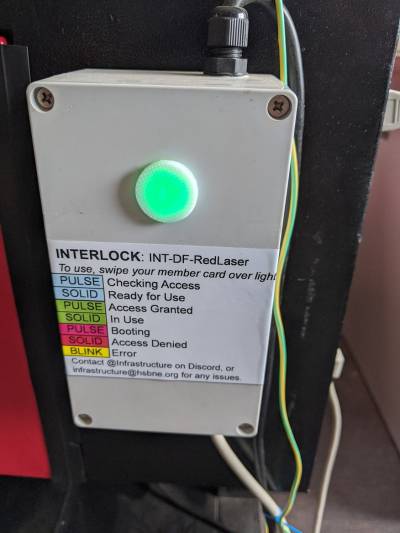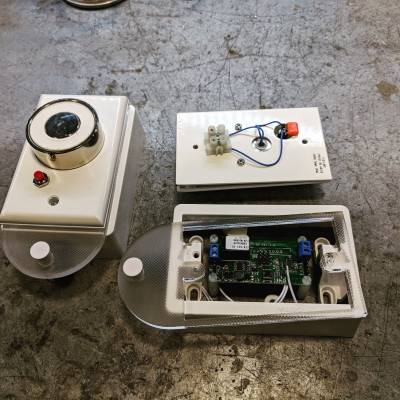Our Current System
Our current system uses ESP8266 based hardware for WiFi-enabled doors, interlocks and vending machine controls.
Hardware
The door and interlock control hardware is in a waterproof project storage box near each door/interlocked machine.
Doors
Door contains a Sonoff TH10, a 240v to 12v cage power supply and uses a GX16 4 pin connector for serial to an external RFID reader and a GX12 to the door bolt/strike/magnet. Each door is secured with an electronic door strike, or maglock depending on whether it is required to fail safe or fail secure.
Wiring Diagram: espdoor_v1_wiring_diagram.pdf
Interlocks
Interlocks contains a Sonoff TH10, a 240v 20A 2Pole NO contactor, a 3.3v RFID reader and a single 20mm threaded case WS2812b led on a custom PCB that is wired into a TRRS connector on the sonoff.
PCB Project: https://easyeda.com/wodann/Interlock_Buzzer-10cdd361c1e342e8851967c3ef5db927
Wiring Diagram: interlock_v2_wiring_diagram.pdf
Drinks Vending Machines
The vending machines run a USB powered ESP8266 board (Wemos D1 Mini) that triggers a drink dispense via a relay.
PCB Project: https://easyeda.com/wodann/Spacebucks-Drinks-D1
Magnetic Door Holders
Our magnetic door holders use a Sonoff SV with a commercial 24v magnetic door holder and a reed switch. The firmware turns on the relay output for 150 seconds after the reed switch closes.
Useful Info
Author(s): Brendan (@nog3)
Current Maintainer(s): No one :(
Running On: Various ESP8266 based devices around HSBNE.
GitHub: Access Control
Software
Door/Interlock Firmware
The firmware running on the Door and Interlock control boxes is stored in GitHub and uses the Arduino development environment. It was written by Brendan Halliday (@nog3). You can see the code here.
Drinks Vending Machine Firmware
The firmware running on the Vending Machine hardware is also stored in GitHub and uses the Arduino development environment. It was written by Brendan Halliday (@nog3) and updated by Jaimyn Mayer (@jabelone). You can see the code here.
Backend System (Member Portal)
Finally, our member portal is a web app written in python and runs on a server at the space. This portal contains the access control system API so that the readers can check access, debit spacebucks, etc. You can access the live portal here. More information, links to GitHub etc is available at member portal.
A history of our Access System
At HSBNE we have a few generations of dedicated networked hardware for RFID locks based on avr chips. All of them have operated with a really basic php + json flatfile db backend running on apache for the 4-5 years we've had them implemented. All have used the eeprom on the avr chip to store a db of approved cards in case the server went down for any reason (This happened a lot until we got to a premises we could designate a server room in).
First there was Snarc (http://old.hsbne.org/projects/SNARC) - It was single door focused, lacked filtering caps on the 5v and 3.3v regulators and overheated lots until we started putting rediculously huge heatsinks on it. (Yay graphics cards heatsinks!) It was also mosfet based, and the wiznet5500 module on it tended to randomly drop network, necessitating a wire fix to allow us to reset the ethernet every 5-10 minutes just in case. I believe the previous president who developed this is still trying to sell them.
Then there was Snarc+ (http://old.hsbne.org/projects/snarcplus) which is POE powered, designed by an (employed) embedded hardware guy and replaced the mosfet with a relay. For some reason it was kinda slow when it came to network comms and so you'd wait up until 30 seconds before your card ID was in the eeprom.
Now we have Netrol (http://circuitcellar.com/wp-content/uploads/2014/10/WZ1262_Project_Pic-150x150.jpg and https://github.com/lhovo/Netrol which is also designed by the same guy as the Snarc+. It's sexy, can operate 12v door strikes and bolts with ease via PoE and is a nicely integrated system at this point. We have these installed in waterproof boxes with ip67 cable glands and waterproof external potted RFID coils that talk rs232, as we ended up giving several Snarc and Snarc+ boards viking burials after someone hot glued them against plywood boards and the weather got in.
In 2018 we moved to the most recent version, which is described above.

